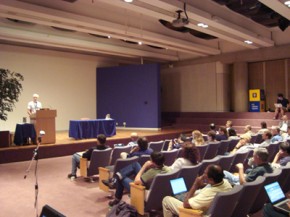WFMU: Dragging Radio into the Present
Day two of the Open Education Conference began with a keynote address from Ken Freedman. Freeman has been working in the radio industry for over 25 years, largely at WFMU where he is station and program manager. Stationed in New Jersey, WFMU has become one of North America’s most recognized and renowned public radio stations for its experimental content and its venture into the online community.
From the get go it was apparent that Freedman is a bit of a renegade and this address was not going to be a traditional educational lecture. In his early days as a radio DJ, Freedman and a colleague hosted an experiment where instead of taking on their normal roles as mediators for the talk radio show, they looped a pre-programmed Casio keyboard tune to play on-air and did not speak until a caller chose to call in. This went on for almost 10 minutes before listeners caught on. Although the experiment was not a success (it quickly became obvious that the audience needed a mediator) it has been innovations like this that have kept listeners coming back to the station. WFMU’s forays into social media have proven to be more successful.
The evolution of WFMU illustrates the evolution educational institutions can make as they embrace new technologies. WFMU has been on air since 1958 when, at the time, it was a college station. The station’s format, in addition to its dedication to the new wave and punk movements in the late 1970s and early 1980s, allowed WFMU to move forward when other public radio stations couldn’t. However, it has been the station’s acceptance of new technologies, especially social online media, which has allowed it to endure, as well as gain a new audience. In 1993 WMFU went online, becoming one of the first public radio stations to post its DJs’ shows as podcasts. Today, the station uses a number of online social media – such as podcasts, online live streaming, message boards and forums, blogging, image galleries, and recently an iPhone application – to build a community connected to the radio station. WFMU now sees more listeners over the Internet than through its local radio broadcast in the New York area. Similarly, educational institutions can reach more students as educators continue to broaden their views of convention.

While the radio station has become a success within the radio industry by achieving growth in audience, WFMU still faces challenges. As Freedman explained, some DJs at the station felt that the message boards, blogging and downloadable podcasts took away from their programs. Surprisingly, this resonated with many attendees. The opening of a social community around the radio station and the DJs’ concerns about loss of control over their programs are similar to worries that educators and academics have with their initial exposure to online learning tools. Often times, when educators are first exposed to open education, they are reluctant to “give up” their control over their work. Like the DJs at WFMU, it only takes experience and understanding for educators to grasp that changes to their traditional methods can and will enhance the learning and teaching process.
With the establishment of the Free Music Archive, WFMU is offering the public free access to new music via the Internet. The Free Music Archive is an interactive library of high-quality, legal audio downloads. The creation of the archive was inspired by Creative Commons and the open source software movement where the archive acts a framework for collaboration between curators, artists and listeners. Freedman also explained how the Free Music Archive will assist the co-op radio station’s finances as the music industry adapts to the digital age. The new Digital Millennium Copyright act has placed limitations on the radio stations, in addition to charging licensing fees. The Free Music Archive has negotiated with artists and record labels for direct and alternative licensing such as Creative Commons, special licensing from record labels, or waivers from artists. To date, the Free Music Archive has received almost 700 waivers from record labels and artists. Although the waivers pertain only to radio play and not the internet, it is a beginning to creating open content for the independent labels, musicians, music lovers, and curators.
While initially Freedman’s keynote address centered on the challenges public radio faces, it quickly became apparent that there are many similarities between open education and WFMU. Both face challenges, yet need to work within the guidelines established by each institution to achieve the greatest connection with their audience.


[…] experience and bringing innovation to institutional teaching and learning, as noted at the UBC CTLT site outlining this talk: Like the DJs at WFMU, it only takes experience and understanding for educators to grasp that […]